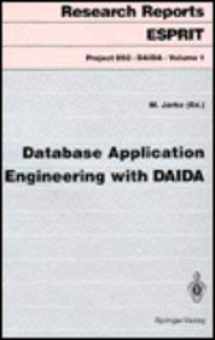
Database Application Engineering With Daida (Research Reports Espirit. Project 892. Daida, Vol 1)
ISBN-13:
9780387562919
ISBN-10:
0387562915
Author:
Matthias Jarke
Publication date:
1993
Publisher:
Springer Verlag
Format:
Paperback
558 pages
FREE US shipping
Book details
ISBN-13:
9780387562919
ISBN-10:
0387562915
Author:
Matthias Jarke
Publication date:
1993
Publisher:
Springer Verlag
Format:
Paperback
558 pages
Summary
Database Application Engineering With Daida (Research Reports Espirit. Project 892. Daida, Vol 1) (ISBN-13: 9780387562919 and ISBN-10: 0387562915), written by authors
Matthias Jarke, was published by Springer Verlag in 1993.
With an overall rating of 4.0 stars, it's a notable title among other
books. You can easily purchase or rent Database Application Engineering With Daida (Research Reports Espirit. Project 892. Daida, Vol 1) (Paperback) from BooksRun,
along with many other new and used
books
and textbooks.
And, if you're looking to sell your copy, our current buyback offer is $0.43.
Description
The development of integrated environments for computer-assisted software engineering (CASE) has proven more difficult than expected. The ESPRIT project DAIDA (Advanced Interactive Development of Data-Intensive Applications) has produced the first prototype of a comprehensive systems environment which manages the whole process of information systems development and maintenance as a multi-layered knowledge base with semi-automatic mapping between the layers. Several DAIDA results have had substantial impact on systems development theory and practice: the language Telos and its usage in the ConceptBase system for modeling knowledge about information systems, the modular database programming language DBPL as a theoretical foundation for future object-oriented databases, the integration of knowledge-based analysis and mapping assistants from requirements capture to running code, and a CAD metamodel of information systems processes including support for configuration management and teamwork. The example of a personnel information system is used throughout the book to illustrate the relationships between the different languages, methods, and tools. The book has three main parts, covering "upper CASE" (requirements analysis and its mapping to initial designs), "lower CASE" (transformation of designs into efficient database programs), and process management. In addition to direct DAIDA results, the book contains contributions from collaborating national and North American projects. The intended audience for the book are practitioners, researchers, and graduate students with an interest in CASE integration for data-intensive information systems.


We would LOVE it if you could help us and other readers by reviewing the book
Book review

Congratulations! We have received your book review.
{user}
{createdAt}
by {truncated_author}


